|
|
|
Sort Order |
|
|
|
Items / Page
|
|
|
|
|
|
|
| Srl | Item |
| 1 |
ID:
093624
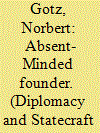

|
|
|
|
|
| Publication |
2009.
|
| Summary/Abstract |
This article examines Norwegian policy vis--vis the United Nations (UN) through the end of 1945. From here it will become clear that framing foreign policy orientations of the 1940s along conventional lines exaggerates the commitment of Norwegian politicians to two grand ideas. The novel idea of Atlantic alignment, developed by Norwegian circles in London exile, was more ambiguous than generally acknowledged and left room for universal extension. By contrast, the alleged turn in the mid-1940s toward support of the UN was in the form of lip-service as opposed to action that would have engaged actors from Norway. The government outsourced policy-making on the issue to a small circle of experts and made no attempt to exert leadership in regard to UN matters. Norway's indifference toward the UN in the 1940s stands in marked contrast to the country's later reputation as a faithful supporter of the world organization.
|
|
|
|
|
|
|
|
|
|
|
|
|
|
|
|
| 2 |
ID:
123956
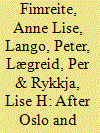

|
|
|
|
|
| Publication |
2013.
|
| Summary/Abstract |
The article addresses the challenges a society faces to when trying to balance security and liberty after a terrorist attack. A main question is to what extent attitudes toward counterterror measures changed in Norway after the massive terror attacks in July 2011. A hypothesis that people will be more in favor of such measures after a terror attack is examined using data from two surveys-one conducted in 2006 and one in August 2011, with additional results from a survey in 2012. The Norwegian response after the 2011 attacks is compared to the response to the same questions in the United States shortly after 11 September 2001. A main finding is that in Norway, in contrast to the United States, levels of support for counterterror measures declined immediately after the attacks. The authors argue that this can be explained partly by the different levels of trust in the two countries, and partly by differences in the political executive's framing of the crisis. In 2012, support of counterterror measures in Norway has risen to pre-2011 levels. This is related to the changed discourse after the publication of the report from the 22 July Commission.
|
|
|
|
|
|
|
|
|
|
|
|
|
|
|
|
| 3 |
ID:
117542
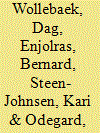

|
|
|
|
|
| Publication |
2012.
|
| Summary/Abstract |
The article examines short-term effects of terror on trust and civic engagement in Norway. Prior to the July 22, 2011 attacks, Norway ranked among the nations with the highest levels of trust and civic engagement in the world. How does a nation of trusters react to terror? Based on two web surveys conducted in March/April 2011 and August 2011 short-term effects on trust, fear, and political interest and participation are analyzed. Two competing hypotheses are explored: first, the "end-of-innocence hypothesis," which assumes that the attacks have disrupted trust and instilled a new culture of fear, and second, the "remobilization hypothesis," which assumes that the attacks have led to a reinforcement of trust and of civic values. Our results show increased interpersonal and institutional trust as well as a modest increase in civic engagement, especially among youth. Moreover, there is little increase in experienced fear within the population. Our study therefore supports the remobilization-of-trust hypothesis. Contrary to the intended aims of the attacker, the structures of trust and civic engagement seem to have been reinforced in Norwegian society. This study in part corroborates findings concerning short-term effects after September 11, 2001.
|
|
|
|
|
|
|
|
|
|
|
|
|
|
|
|
| 4 |
ID:
123792
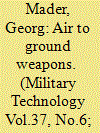

|
|
|
|
|
| Publication |
2013.
|
| Summary/Abstract |
The range of potentially looming or very real threats is broad, as are the assets already used today, be it, Iran's underground nuclear enrichment sites or Islamist irregulars in Toyotas. This survey is a stroll through recent selected developments in modern air to ground weapons (ATGW) countering these threats.
|
|
|
|
|
|
|
|
|
|
|
|
|
|
|
|
| 5 |
ID:
111123
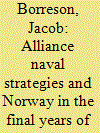

|
|
|
|
|
| Publication |
2011.
|
| Summary/Abstract |
F
or those of us who served in the Norwegian armed forces, especially in
northern Norway, the 1980s were exciting times. Norway seemed to be the
focus of American and NATO attention. There was a continuous flow of
high-ranking visitors to Defence Command North Norway (DEFCOMNON),
from the staffs of Allied Command Europe (ACE) and Atlantic (ACLANT).
1
Every year thousands of allied soldiers, hundreds of aircraft, and dozens of ships
arrived in the area to conduct advanced training and complex exercises. High
points were the deployments of U.S. Navy aircraft carriers, elements of Supreme
Allied Commander, Atlantic's (SACLANT's) Striking Fleet Atlantic, into northern Norwegian coastal waters in Vestfjorden, outside Bodø: in 1985, USS America (CV 66) and, in 1987, USS Forrestal (CV 59) in Exercise OCEAN SAFARI; in
1988, USS Theodore Roosevelt (CVN 71) and Forrestal in TEAMWORK; and in
1989, America in NORTH STAR.
2
We were witnessing, and took part in, what later
turned out to be the culmination of the Cold War-the period of tension that
eventually led to the collapse of the Soviet Union. Norway, neighbor to the Soviet Union and a coastal state on the North Atlantic and the Barents Sea, found
itself at the geographical center of this final effort.
|
|
|
|
|
|
|
|
|
|
|
|
|
|
|
|
| 6 |
ID:
124307
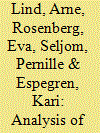

|
|
|
|
|
| Publication |
2013.
|
| Summary/Abstract |
The EU renewable energy (RES) directive sets a target of increasing the share of renewable energy used in the EU to 20% by 2020. The Norwegian goal for the share of renewable energy in 2020 is 67.5%, an increase from 60.1% in 2005. The Norwegian power production is almost solely based on renewable resources and the possibility to change from fossil power plants to renewable power production is almost non-existing. Therefore other measures have to be taken to fulfil the RES directive. Possible ways for Norway to reach its target for 2020 are analysed with a technology-rich, bottom-up energy system model (TIMES-Norway). This new model is developed with a high time resolution among others to be able to analyse intermittent power production. Model results indicate that the RES target can be achieved with a diversity of options including investments in hydropower, wind power, high-voltage power lines for export, various heat pump technologies, energy efficiency measures and increased use of biodiesel in the transportation sector. Hence, it is optimal to invest in a portfolio of technology choices in order to satisfy the RES directive, and not one single technology in one energy sector.
|
|
|
|
|
|
|
|
|
|
|
|
|
|
|
|
| 7 |
ID:
111887
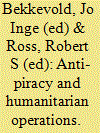

|
|
|
|
|
| Publication |
Norway, Norwegian Institute for Defence Studies (IFS), 2012.
|
| Description |
79p.
|
|
|
|
|
|
|
|
|
|
|
|
Copies: C:1/I:0,R:0,Q:0
Circulation
| Accession# | Call# | Current Location | Status | Policy | Location |
| 056491 | 359.03/BEK 056491 | Main | On Shelf | General | |
|
|
|
|
| 8 |
ID:
116365
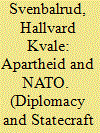

|
|
|
|
|
| Publication |
2012.
|
| Summary/Abstract |
In the 1970s, questions of apartheid and decolonisation rose to the forefront of international political debate. Building on recently declassified, multinational archival research, this analysis assesses the question of whether to impose international economic sanctions against the apartheid regime in both South Africa and white minority-ruled Rhodesia during this decade. The issue of sanctions became a strain on the relationship between Great Britain and the three Scandinavian states-Denmark, Norway, and Britain, were allies within the North Atlantic Treaty Organisation. Wary of communist influence in Africa as well as concerned about protecting their interests on the continent, the British preferred moderate measures and a long-term perspective when dealing with Southern Africa. The Scandinavian Powers, building a reputation as internationalist and progressive states and with few national interests in the area, presented themselves as leading advocates of sanctions against South Africa and Rhodesia. These differences in approach caused recurring tension between the British and their Scandinavian allies, even leading some British officials to suggest sanctioning Norway and Sweden for their Southern Africa policy. However, the end of white minority rule in Rhodesia in 1980 as well as the increasing focus on European security matters during the second Cold War of the early 1980s reduced Anglo-Scandinavian tension over Southern Africa, with the Powers continuing their close relationship throughout and beyond the Cold War.
|
|
|
|
|
|
|
|
|
|
|
|
|
|
|
|
| 9 |
ID:
101715


|
|
|
| 10 |
ID:
112057
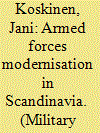

|
|
|
| 11 |
ID:
073527
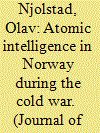

|
|
|
|
|
| Publication |
2006.
|
| Summary/Abstract |
Thanks to its geographical location and close military ties to the US and Britain, Norway took substantial part in the Western intelligence effort against the Soviet nuclear weapons programme during the Cold War. Norway's relative proximity to the nuclear weapons test sites on Novaya Zemlya and the nuclear submarine bases on the Kola Peninsula was of particular importance in this regard. Whereas the tasks of surveying the development, deployment and possible employment of Soviet nuclear forces always had first priority, Western atomic intelligence conducted from Norwegian soil and waters was occasionally aimed even at gathering information about the geophysical and possible long-term medical and environmental implications of high-yield nuclear explosions in the atmosphere.
|
|
|
|
|
|
|
|
|
|
|
|
|
|
|
|
| 12 |
ID:
125753
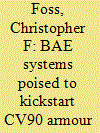

|
|
|
|
|
| Publication |
2013.
|
| Summary/Abstract |
Production of BAE systems combat vehicle 90 (CV90) ended in 2011 after 18 years of construction for six international customers, but is poised to restart for Norwegian service.
|
|
|
|
|
|
|
|
|
|
|
|
|
|
|
|
| 13 |
ID:
089203
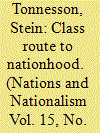

|
|
|
|
|
| Publication |
2009.
|
| Summary/Abstract |
This essay explores the proposition that China and Vietnam represent a fourth class route to modern nationhood, in addition to the ethnic (German), civic (French) and plural (American) routes. Nation-states emerging along the class route are characterised by an exclusive membership based on social class rather than just ethnicity, living under the same laws or participation in liberation from foreign rule. The essay compares China's and Vietnam's class-based nationalism with the more inclusive labour movement nationalisms of Norway and Cyprus. Then it explains how the class route differs from the French civic route. In the conclusion, the author concedes that the Chinese and Vietnamese class route is perhaps a detour rather than a route of its own, since it leads to inevitable tension between the divisive history of how the nation was formed and the need of its later leaders to include and represent the same social classes that were originally excluded. These leaders and their national storytellers are forced to undertake a redefinition of the national self as ethnic, civic and/or plural in an attempt to recreate national legitimacy, often in competition with more radically nationalist opposition groups.
|
|
|
|
|
|
|
|
|
|
|
|
|
|
|
|
| 14 |
ID:
104436
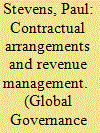

|
|
|
| 15 |
ID:
167458
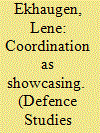

|
|
|
|
|
| Summary/Abstract |
In complex operations such as the interventions in Iraq and Afghanistan, where multiple government ministries are involved in putting together a state’s contributions, the use of national-level coordination bodies has become more widespread. Research has taken for granted that the rationale behind these bodies reflects their declared aim – enhanced coordination as a means to improve mission effectiveness. However, they appear to have had modest effect on coordination. That notwithstanding, they seem to remain popular. This prompts us to ask why such bodies are actually established. This article – based on in-depth interviews and archival records – critically explores the establishment of Norway’s ad hoc, inter-ministerial, political-level Afghanistan Forum. Distinguishing between a structural-instrumental, a cultural-institutional and an environmental perspective from organizational theory to structure the analysis, this article shows that the declared purpose of the forum, inter-ministerial coordination, proved less important than showcasing coordination efforts and keeping the coalition together. In addition, national traditions in handling coordination challenges in the central government apparatus and powerful international reforms helped bring the forum about. This has implications for research on the rationale and effectiveness of these bodies, and also for understanding their policy relevance.
|
|
|
|
|
|
|
|
|
|
|
|
|
|
|
|
| 16 |
ID:
155839
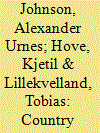

|
|
|
|
|
| Summary/Abstract |
This article examines military expenditure and defence policy in Norway from 1970 to 2013. Until 1990 Norwegian military expenditure remained between 2.5 and 3.0 per cent of Gross Domestic Product (GDP). Despite constant GDP shares, the military expenditure could not sustain a large and properly armed mobilization army. The constant nominal defence budgets of the 1990s accentuated the Norwegian Armed Forces' underlying imbalance between tasks, structure and budget. Around year 2000, large organizational reforms were effectuated, in which costs, the number of man-years, and underlying imbalances between tasks, structure and budget were reduced. Military expenditure increased in nominal terms between 2003 and 2013, while real military expenditure remained practically constant.
|
|
|
|
|
|
|
|
|
|
|
|
|
|
|
|
| 17 |
ID:
084349
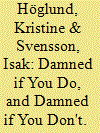

|
|
|
|
|
| Publication |
2008.
|
| Summary/Abstract |
Third-party actors who mediate or monitor peace often strive to uphold an image of neutrality. Yet, they commonly face accusations of partiality. The Nordic engagement in the Sri Lankan peace process is an illustration of this puzzle: despite the efforts to uphold an image of being neutral mediators and monitors, they have been seen as favoring one side or the other. This article suggests that part of the explanation for their failure to be seen as neutral lies in the fact that armed conflicts are characterized by certain asymmetries between the main antagonists - in capabilities, status and behavior. These imbalances pose particular challenges to the third party aspiring to act in a neutral manner. We suggest that third parties have two strategies available to deal with imbalances in the relationship between the contenders: 1) they can choose to disregard the asymmetrical relationship and act in an even-handed manner or 2) they can seek to counterbalance the lopsidedness. This article explores the dynamics of these strategies by analyzing the Nordic involvement in Sri Lanka's peace process that began in 2002.
|
|
|
|
|
|
|
|
|
|
|
|
|
|
|
|
| 18 |
ID:
116576
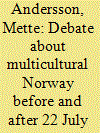

|
|
|
| 19 |
ID:
144730
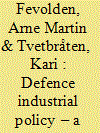

|
|
|
|
|
| Summary/Abstract |
This article explores whether it makes sense for national governments to employ defence industrial policies – such as offsets and discriminatory procurement practices – to support their domestic defence industries. This question has so far primarily been discussed by economists, who have argued strongly against the use of defence industrial policies. This article maintains that these economists fail to address the often complex motivation behind the introduction of these policies. It illustrates these shortcomings by contrasting their arguments against a case study of Norway, which accounts for the country’s use of defence industrial polices from the early post-Second World War era up until today. The article concludes that, depending on their objectives, defence industrial policies can be seen as either a sound security strategy or an economic fallacy.
|
|
|
|
|
|
|
|
|
|
|
|
|
|
|
|
| 20 |
ID:
100141


|
|
|
|
|
|
|
|